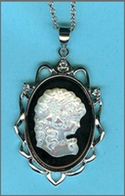Alexandra (47 page)


To enter, visit the
contest page
on Lauren and Devon’s website at
LaurenandDevonRoyal.com
and answer a question to be entered in the monthly drawing.
No purchase necessary. See complete rules on the site.
*Please note: Depending on when you enter, the prize may be another piece of jewelry associated with one of the Royals’ books.
JULIANA
 Book Two of the
Book Two of theRegency Chase Brides series
Lady Juliana Chase has never met a problem she couldn’t solve—or one she could resist. If friends and family don’t always appreciate her efforts on their behalf, well, that’s only because they underestimate her. James Trevor, the young Earl of Stafford, is a prime example—Juliana
knows
her friend Amanda is the perfect match for James, but he seems intent on spoiling her plans. Lucky for him, “defeat” isn’t in Juliana’s vocabulary…
Just as James realized his dream of studying medicine, tragedy stole the love of his life. Though it’s time to move on, the last thing he wants is another romantic entanglement—ever. But somehow he’s got
two
: first, this ridiculous matchmaking scheme of Juliana’s, and second, an inexplicable infatuation with the matchmaker herself. If he’s going to get the girl, he’ll have to beat her at her own game—and there’s no easy victory when you’re playing with the stubbornest, most cunning meddler in all of London…
Read an excerpt…
The Foundling Hospital, London
Saturday, June 8, 1816
LADY JULIANA
Chase’s sisters often accused her of looking for trouble. Of sticking her nose where it didn’t belong. Of exaggerating—if not outright imagining—other people’s problems and sorrows and miseries.
But she would swear she’d never seen anything quite so sad in her life.
Upstairs in the Foundling Hospital’s picture gallery, she stared through the window down into the courtyard. There, arranged in six neat, regimented lines, a hundred or more young girls performed calisthenics, resignation written on their faces. In all of her seventeen years, Juliana couldn’t remember ever feeling that grim.
“William Hogarth was a genius.”
Sighing, she turned from the window to see her younger sister scrutinizing the art on the gallery’s pale green walls. “I thought you preferred the Dutch masters.”
“I do,” Corinna said. “But look at the characters in this painting.”
The work was titled
The March of the Guards to Finchley
, and the people depicted were, indeed, characters. Humor, rowdiness, and disorder abounded. “The drummer looks quite amused,” Juliana said, swiveling back to the window.
The painting seemed a striking counterpoint to the figures outside.
Miss Emily Neville, Juliana’s eight-year-old next-door neighbor, stood beside her, gazing upon the same scene. “The girls don’t appear to be ill. So why are they in hospital?”
“
Hospital
is an old word that originally meant ‘guesthouse,’” Miss Strickland, the battle-axe of a woman assigned to shepherd visitors through the orphanage, explained in her no-nonsense way. “This is a charitable institution for children whose mothers couldn’t keep them.”
“My mother died.” Still gazing outdoors, Emily absentmindedly raised a hand to stroke her beloved pet, Herman, whom she always carried on her shoulder—or rather, draped around her shoulders. “May I play with the girls?”
Ranging in age from about five to perhaps fourteen, the children all had identical haircuts and wore aprons of stiff, unbleached linen over brown serge dresses. Juliana smoothed her palms over her own soft yellow skirts. “I’m afraid your pet might scare them.”
“The girls aren’t playing.” Miss Strickland crossed her arms. “They’re exercising. Outdoor exercise is advocated for maximum health. And you couldn’t play with them in any case, young lady, with or without that horrid creature.”
“Herman isn’t horrid,” Emily said, turning to the older woman. “He’s quite friendly, and he couldn’t hurt a soul, I assure you. See the black bars along his sides and the yellow collar behind his head?” She lifted Herman’s head to show Miss Strickland. “He’s just a harmless, common—”
“Get it away!” the woman shrieked.
Juliana hid a smile. Not long ago, she’d received the very same lecture from her young neighbor. For a child of eight, the girl spoke with impressive eloquence and conviction. Not to mention persistence.
Still, her pet snake would have to go.
Emily was Juliana’s latest project, and Juliana was sure that with a bit of patience she could turn the child into a perfect little lady. A young lady of good grace and courtesy—most especially the courtesy to leave one’s reptile at home. A few more outings like this one ought to convince her that Herman would never be welcome in public.
She took Emily’s hand and gave it a squeeze, then looked back to Miss Strickland. “Do the girls
ever
play?”
“Of course they do,” Miss Strickland said. “For an hour every Sunday.” As though suddenly remembering her duty—principally to encourage donations—she stretched her lips into an unnatural smile. “Are you ladies enjoying your visit to the gallery?”
“Very much.” Corinna moved to view the next painting. “George Lambert,” she breathed. An artist herself, she’d suggested this day’s outing to the Foundling Hospital’s gallery. “What a lovely scene.”
Mr. Lambert’s picture
was
lovely, but Juliana couldn’t peruse the painted people for long. Not when there were real people—disadvantaged children—to consider.
“What do the foundlings do all day?” she asked. “If they don’t play?”
Miss Strickland began reciting by rote. “They rise at six and prepare for the day, the older girls dressing the younger children, the boys pumping water and such. At half past seven they breakfast, and at half past eight they begin school. At one o’clock they dine and return to school from two until dusk.” She paused for a much-needed breath. “After supper, those not employed about the buildings are instructed in singing the Foundling Hymns and anthems, and in their catechism. At eight they go to bed.”
What a life. Thinking about her own days and nights filled with parties and shopping and dancing, Juliana swallowed a lump in her throat. Still, the children looked healthy, warmly clothed, and well fed—which she supposed was more than could be said for much of London’s youth.
“Is there anything I can do to help?” she asked.
“Certainly, my lady. We are always pleased to accept monetary donations.”
Juliana knew that was one of the purposes of the gallery. Popular artists donated paintings and sculpture, a scheme that not only earned favorable publicity for the artists, but brought the Hospital wealthy and aristocratic visitors—exactly the sort of people who might commission works of art for themselves and be persuaded to become patrons of the Hospital. It was a most satisfactory arrangement for all concerned.
But Juliana hadn’t the option to become a patroness just yet. While she had a substantial dowry and wasn’t in any way deprived—quite the opposite, in fact—as an unmarried girl she had no money of her own, other than a small allowance granted by her brother, Griffin. “I cannot donate significant funds,” she said apologetically.
Miss Strickland aimed a rather disbelieving look down her knife-edged nose, pointedly skimming her gaze over Juliana’s fashionable dress.
“I cannot,” Juliana repeated firmly. “But I should like to do something.” She could ask Griffin to donate, of course—and she would. But she wanted to contribute herself. “Perhaps I could make clothing for the children.” Her allowance was surely enough to cover the fabric.
“The children have no need of clothing. They wear uniforms, as you’ve seen.”
Juliana had seen the boys eating luncheon in their dining room, all wearing white linen shirts with military-style suits made of the same brown serge as the girls’ dresses. “But someone has to
make
the uniforms.”
“The girls make and repair them during their sewing lessons.”
“Then perhaps I can make treats,” she suggested. “The ladies in my family are rather renowned for our sweets.”
“The children are all fed a plain, wholesome diet. Sweets aren’t allowed except on very special occasions. However, food does account for a large proportion of the Hospital’s budget, so your monetary donation would be much appreciated.” Before Juliana could repeat that she had no money to give, Miss Strickland continued. “This is a reception day. Perhaps looking upon the infants might persuade you.”
Though Juliana knew nothing could change her mind, she adored tiny babies. “We should very much like to see the infants,” she said, drawing Emily toward the door.
“I’m not finished looking,” Corinna said, finally moving to view the next painting.
The battle-axe cast her a speculative glance. “Well, then, the horrid snake can stay with you.”
“Herman isn’t horrid!” Emily said, pulling her hand from Juliana’s. “If Herman stays, I shall stay.” She marched over to take Corinna’s hand instead. “There’s an infant right here in this picture.”
Corinna nodded her dark head. “It’s Andrea Casali’s
Adoration of the Magi
.”
Juliana would never understand how anyone could stare at a single painting for so long. Two minutes with any painting, and she was finished. But then, she’d never been as interested in things as she’d been in people. “What’s a reception day?” she asked, trailing the battle-axe out of the room.
Miss Strickland led her down a corridor. “On the second Saturday of every month, mothers are invited to bring their babies for possible admission.”
“Possible?”
“They must meet specific criteria. An acceptable candidate must be under twelve months of age, the mother’s first child, and healthy, so as not to risk infecting other children. In addition, although only illegitimate offspring are admitted, the mother must establish her good character. A secondary purpose of the Hospital, you see, is the restoration of the mother to work and a life of virtue. Most petitions come from women who were seduced with promises of marriage and then deserted when they became pregnant. In such cases, many mothers can avoid disgrace and find employment only if they give up their children.”
“How awful!” Juliana felt a twinge in her chest. She couldn’t begin to imagine the heartbreak of having a baby and then needing to give it up. She certainly wasn’t exaggerating
these
mothers’ sorrows and miseries.
Miss Strickland opened a door. “The Committee Room,” she whispered.
Inside the elegant chamber, a queue of young mothers clutched their infants tightly, the expressions on their faces a mixture of anguish and hope. Their simple cloaks and aprons were a poignant contrast to the silk gowns of the fashionable lady patronesses who’d come to observe the spectacle.
And what a spectacle it was. Juliana’s chest began to ache.
As she watched, a mother about her age was invited to the front, where a well-dressed man held out a cloth bag. Shifting her baby, the mother reached a trembling hand into the bag and pulled out a little red ball. She swallowed hard and, gripping the ball in her white-knuckled fist, stepped off to join a small group of mothers and babies huddled at one side.
Abandoning the battle-axe, Juliana walked over to join the other spectators. “What does the ball mean?” she asked in a whisper.
A tall, middle-aged woman answered in kindly tones. “The system is called balloting. These mothers have already been screened and deemed acceptable. But the Governors can accept only ten infants at a time. Balloting is the fairest method of allocating places.”
As she finished her explanation, another young woman drew a ball—a black one—and let it fall to the floor, tears spilling down her cheeks as she ran from the room, taking her baby with her.
“Black is bad?” Juliana asked.
“Mothers who draw black balls are immediately turned out of the Hospital. A white ball means the baby will be examined and admitted if it is healthy. Mothers who draw red balls are invited to wait and see whether any babies are refused admittance, in which case they are given a second chance to enter the lottery.”
